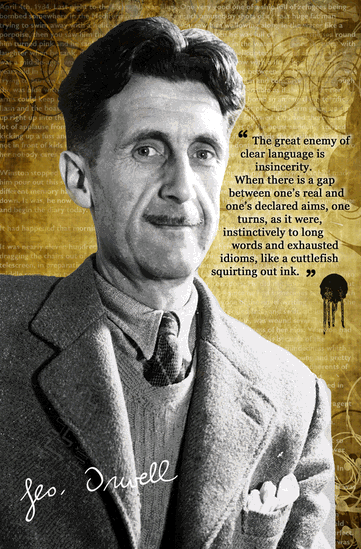|
|
|
|
|
|
|
News & Views item - September 2013 |
![]() Steven Schwartz Looks to the Future in Interviewing Eric Blair (AKA George
Orwell). (September 16, 2013)
Steven Schwartz Looks to the Future in Interviewing Eric Blair (AKA George
Orwell). (September 16, 2013)
 In
a scathing opinion piece published in the Higher Education section of the
September 11, 2013 Australian the former vice-chancellor of Macquarie
University now executive director of the Council for the Humanities, Arts and
Social Sciences, Steven Schwartz, "interviews" Professor Eric Blair, Faculty of
Useless Knowledge, the University of Wasteful Research sometime in the future.
In
a scathing opinion piece published in the Higher Education section of the
September 11, 2013 Australian the former vice-chancellor of Macquarie
University now executive director of the Council for the Humanities, Arts and
Social Sciences, Steven Schwartz, "interviews" Professor Eric Blair, Faculty of
Useless Knowledge, the University of Wasteful Research sometime in the future.
Below, a short excerpt but please go to the URL to read Professor Schwartz's complete contribution.
Professor Blair: Canberra has long been deserted and archaeologists have ignored it. I thought it might be an opportunity to shed some light on a neglected part of history... My team organised a dig. It was easy at first, just removing the sand. But then we hit a hard layer that consisted of shredded election pamphlets.
Professor Schwartz: Were there problems deciphering these documents?
Professor Blair: Initially, yes. For example, consider this extract found in the first weeks of digging: "Australia must be repositioned for growth, with a re-interfacing of the digital superhighway so that our country is at the cutting edge of the knowledge-based post-industrial paradigm. Academics in the research space need to push the envelope and start to think outside of the circle, square and box. Academic research should aim to make Australia an innovative, seamless, borderless, world-class, business-facing country going forward."
Professor Schwartz: What does that mean?
Professor Blair: We're still working on it.
:
:
Professor Schwartz: Is this when you made your discovery?
Professor Blair: Yes. Packed in among the flotsam and jetsam was an interview given by an obscure parliamentary backbencher called Jamie Briggs in which he denounced research in the arts and humanities as "wasteful". In his remarks, he sneered at philosophy, frowned on history and wrinkled his lip at anthropology. He assessed research projects by their titles and rejected any that did not appear to lead to "practical" economic outcomes that increased gross domestic product.
Professor Schwartz: What is the significance of this?
:
:
Professor Blair: ... a sound economy is not an end in itself. It is a tool that can be used to help a nation reach its social goals. However, first a nation must actually have social goals. Unfortunately, Australia had become a nation of means without ends. In the words of a political leader not forgotten, Robert Kennedy, "gross national product does not include the beauty of our poetry or the intelligence of our public debate; measures neither our wit nor our courage, neither our wisdom nor our learning, neither our compassion nor our devotion to our country; it measures everything, in short, except that which makes life worthwhile."